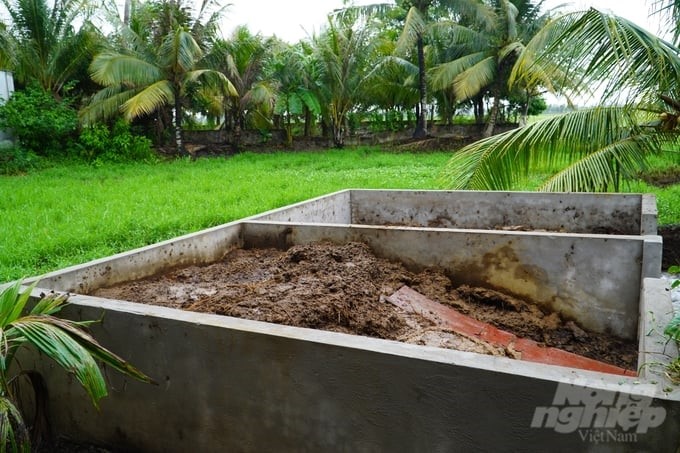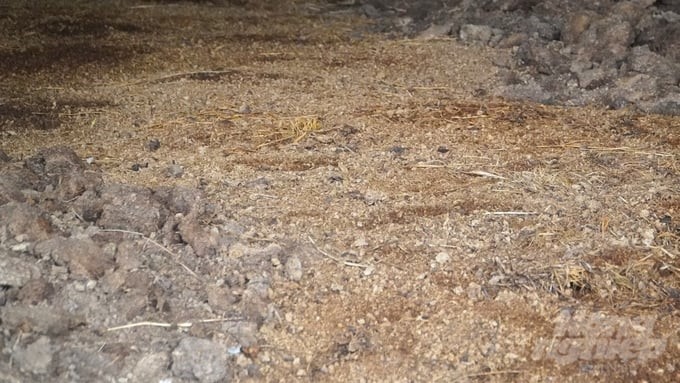June 2, 2025 | 12:42 GMT +7
June 2, 2025 | 12:42 GMT +7
Hotline: 0913.378.918
June 2, 2025 | 12:42 GMT +7
Hotline: 0913.378.918

Improving food rations for dairy and beef cattle farming through the use of forage is an effective solution to minimize gas emissions. Photo: Kim Anh.
On April 28, 2023, the Ministry of Agriculture and Rural Development issued Decision No. 1693/QD-BNN-KHCN approving a plan to mitigate greenhouse gas emissions (including a plan to reduce methane emissions) in the agriculture and rural development sector until 2030, with an orientation to 2050.
According to this decision, by 2030, the agriculture and rural development sector will ensure a total reduction in greenhouse gas emissions of at least 121.9 million tons of carbon equivalent. Thereby, contributing to the country's commitment to achieving net zero emissions by 2050, creating a basis for sustainable development, and enhancing the added value and competitiveness of the sector.
Particularly for activities to mitigate greenhouse gas emissions in the livestock field, the agriculture and rural development sector focuses on improving food rations for dairy and beef cattle farming through the use of silage forage. This aims to minimize methane emissions and improve the productivity of dairy and beef cattle.
In addition, food mixing analysis software is applied to build food rations that meet nutritional needs and have low emissions. Or improve technology to reuse livestock waste as organic fertilizer. Typically, apply microbial technology in composting and manure and urine separation technology in pig farming to improve the efficiency of livestock waste treatment.
According to the Soc Trang Sub-Department of Animal Husbandry and Veterinary Medicine, in recent times, to implement measures to reduce greenhouse gas emissions in the livestock field in the province, the unit has taken advantage of resources from projects such as the Mekong Delta Integrated Climate Resilience and Sustainable Livelihoods (MD-ICRSL) Project. The Low Carbon Agricultural Support Project (LCASP) supports pig farmers in improving technology and reusing waste to improve the efficiency of livestock waste treatment and produce organic fertilizer.

Taking advantage of resources from projects, Soc Trang supports farming households to collect animal waste into compost holes to reuse as fertilizer for plants. Photo: Kim Anh.
Specifically, with resources from the MD-ICRSL Project, Soc Trang province has built 158 models of applying biological pads. As for livestock households in communes that meet new rural standards, veterinary staff encourage them to collect animal manure into compost holes to reuse as fertilizer for plants.
From the capital of the LCASP Project, over 3,300 models of biogas works (biogas tunnels) have been formed. Besides, the project also supported the successful construction of two comprehensive livestock waste management models through the application of biogas generators and manure separators for cattle farms in Tran De and Chau Thanh districts, Soc Trang province.
In addition, models of using farm-scale biogas generators or models of using biogas wastewater as fertilizer for plants also exist in Soc Trang province and are being widely applied by people.
Mr. Lam Minh Hoang, Director of the Soc Trang Sub-Department of Animal Husbandry and Veterinary Medicine, assessed that in general, activities to promote the application of livestock waste management technology are creating positive signals for mitigating greenhouse gas emissions in the area.

Applying technology to reuse waste and produce organic fertilizer will contribute to mitigating greenhouse gas emissions. Photo: Kim Anh.
From there, improve the farming environment in terms of odor and create an additional source of income for farming households through cost savings by replacing biogas fuel, increasing clean energy sources, and reducing environmental pollution. At the same time, actively contribute to the sector's disease prevention and control work.
Currently, the Soc Trang Sub-Department of Animal Husbandry and Veterinary Medicine is regularly and increasingly guiding farmers to apply biosafety and disease-safe livestock measures in the direction of applying high technology. Join hands with the agriculture and rural development sector to reduce greenhouse gas emissions.
The Low Carbon Agricultural Support Project (LCASP) is funded by the Asian Development Bank (ADB) with a total investment capital of about USD 84 million. The project is implemented in 10 localities: Lao Cai, Son La, Phu Tho, Bac Giang, Nam Dinh, Ha Tinh, Binh Dinh, Tien Giang, Ben Tre, and Soc Trang.
The LCASP Project includes four components: livestock waste management; credit for biogas value chains; transfer of low-carbon agricultural production technology; and project management.
Through the project, management activities of livestock waste, scraps, and by-products in biogas production are improved. Minimize environmental pollution, contributing to the development of sustainable household farming and farm livestock. At the same time, create clean energy sources, improve livelihoods, and improve the quality of life of rural people.
Translated by Thu Huyen

(VAN) Several scientists and farmers are experimenting with soil treatment in some key durian-growing regions such as Cai Lay (Tien Giang), Dak Song, Gia Nghia, and Dak R’lap (Dak Nong).
/2025/05/25/4127-3-073637_820.jpg)
(VAN) Thanks to the promotion from an FAO-implemented project, vegetable production in greenhouses in Moc Chau has seen strong development, from 1.5 hectares in 2021 to nearly 50 hectares in 2024.

(VAN) FAO has recently supported USD 140,000 to implement the project 'Risk mitigation human-animal interface risks through disease control initiatives in pig farming.'

(VAN) The People's Committee of Tra Vinh province has approved an adjustment to the investment policy for the Green Hydrogen Plant project, increasing its area to approximately 52.76 hectares.
![Reducing emissions from rice fields: [2] Farmers’ commitment to the soil](https://t.ex-cdn.com/nongnghiepmoitruong.vn/608w/files/news/2025/05/05/dsc08881jpg-nongnghiep-140632.jpg)
(VAN) Clean rice cultivation model in Thuong Tan commune, Bac Tan Uyen district, is assisting local residents in achieving sustainable agriculture by substantially reducing costs, increasing productivity, and protecting the environment.

(VAN) At the conference to disseminate Resolution No. 68, AgriS introduced its digital agricultural ecosystem and reaffirmed its commitment to accompanying the Government in promoting private sector development and sustainable agriculture.

(VAN) 'Blue Ocean - Blue Foods' initiative is designed to restore marine ecosystems and establish sustainable livelihoods for local communities by cultivating a minimum of 1,000 hectares of cottonii seaweed in the first three years.